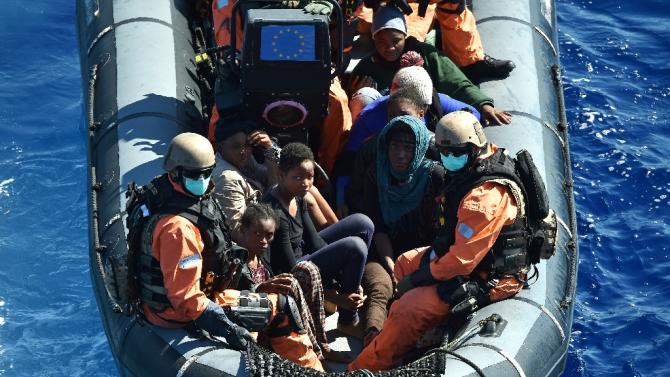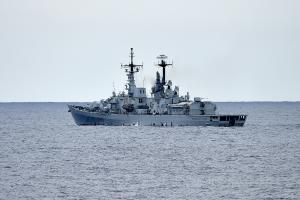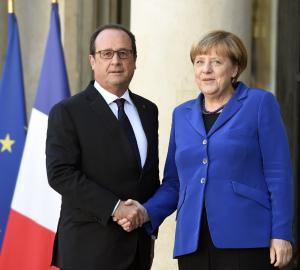Date: Wed, 7 Oct 2015 13:39:14 +0200
By Marine Laouchez
Strasbourg (France) (AFP) - European warships in the Mediterranean launched a new operation Wednesday to catch migrant smugglers as the leaders of Germany and France were to push for further EU action to cope with the refugee crisis.
Chancellor Angela Merkel and President Francois Hollande will give a joint speech to the European Parliament, the first of its kind since 1989, in a bid to present an image of solidarity at a time of deep divisions in the EU.
The military mission dubbed Operation Sophia involves six naval vessels in international waters off Libya with the power to stop, board, seize and destroy traffickers' boats in a bid to curb the worst crisis of its kind since World War II.
- 'We want to arrest them' -
Around 3,000 people have died making the perilous crossing over the Mediterranean to Europe this year, while over half a million have made the voyage, mostly landing in Greece and Italy.
The first phase of the operation, which involved monitoring trafficker networks and rescuing refugees from rickety boats crossing the Mediterranean, has been running since June.
"Assets will conduct boarding, search, seizure and diversion, on the high seas, of vessels suspected of being used for human smuggling or trafficking," the EU mission said in a statement.
An Italian aircraft carrier, a French frigate and one British, one Spanish and two German ships are all involved in the mission, which follows in the footsteps of EU anti-piracy operations on the Horn of Africa.
"We follow the traffickers and want to arrest them and seize their ships," Captain Stefan Klatt, who commands the Werra, one of the German ships that is taking part in the operation, told AFP.
- Berlin Wall -
The EU gave the go-ahead for the operation in international waters in September, but its ships are not, for now, allowed to pursue traffickers into Libyan waters.
At least three other vessels supplied by the Belgian, British and Slovenian navies are expected to arrive in the area at the end of October to complete the force, which also include four aircraft and 1,318 personnel.
But the operation is a drop in the ocean compared to the huge scale of a problem that has seen 630,000 migrants illegally enter the EU this year as people flee conflict in Syria, Afghanistan and Iraq.
Turkey is now the main launching point for migrants trying to enter Europe, and the EU on Tuesday offered Ankara a plan under which it would resettle more refugees if the Turks establish new camps and boosts its coastguard.
With the European project creaking under the strain of the huge movement of desperate people, Merkel and Hollande were to issue a rallying cry in their speech to European lawmakers in Strasbourg.
The last time the leaders of France and Germany stood together in parliament was 26 years ago when Francois Mitterrand and Helmut Kohl gave a similar speech just weeks after the fall of the Berlin Wall.
They are expected to highlight a common and multifaceted solution to the crisis that calls for admitting tens of thousands of genuine refugees, tightening EU external borders and cracking down on smugglers.
But Europe has been deeply divided over how to respond to the crisis, which in addition to the Mediterranean has seen a new front opening over the summer in Hungary and Croatia as migrants cross the Balkans
Plans to relocate 160,000 refugees to other EU nations from overstretched Greece and Italy were only adopted last month after EU leaders overrode objections from eastern European states.
The crisis has also fuelled the rise of nationalist and eurosceptic parties, as well as feeding the debate over Britain's membership of the EU, which is set to be put to a vote before the end of 2017.
Two Iranians were arrested and remanded in custody after having walked through the Channel Tunnel from France to Britain, police said Wednesday, the latest in a series of breaches.


